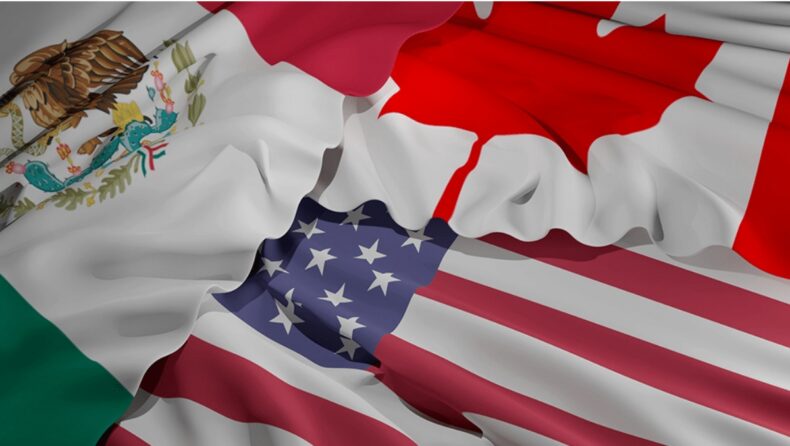U.S. President Joe Biden, Mexican President Andrés Manuel López Obrador & Canadian Prime Minister Justin Trudeau – met at Mexico City for a two-day summit that concluded on Tuesday, which witnessed discussions concerning regional cooperation.

Table of Contents
The 10th North American Leaders’ Summit, often nicknamed by the press as the ‘Three Amigos Summit’ for its trilateral regional membership – was the second of its kind attended by Joe Biden since his stint at the U.S. Presidency, revived from the dead after its discontinuation during the Trump presidency. After the end of the summit, Biden commented,
‘We cannot wall ourselves from shared problems.’
– Joe Biden
The recent decline in North-American cooperation was clearly the underlying tone of the summit, and experts believe that bringing Mexico up-to compliance on several issues was the prerogative of both USA & Canada. The summit presented the leaders a platform to share insight and find solutions on a variety of issues – drug trafficking, cross-border migration, climate change and stagnant economic cooperation, among others.
Let us dive deeper into the background of some of these issues and its importance in maintaining the regional partnership among the three North-American countries.
Drug Trafficking & Security

The cross-border drug trafficking that takes place between Mexico & U.S.A, and consequently spills-over to Canada, is one of the most critical security issues that impact the regional partnership between the three nations. The need for Mexican cooperation on the issue of controlling drug-trafficking was one of the main issues on Biden’s agenda for the summit.
In the past there has been significant deterioration in joint narcotics cooperation initiatives, due to diplomatic misunderstandings and the Mexican government’s reluctance in dealing with the drug cartels. As levels of violence reach the highest of levels, and narcotics continue to flow through the borders – this summit came at a time when significant action was required to be taken.
The three leaders discussed exclusively on this agenda, and as a sort of a theatrical presentation of Mexican cooperation in this issue, the Mexican authorities arrested Ovidio Guzmán Lopéz — a son of the former drug lord ‘El Chapo’ in the week before the summit. The leaders at the summit also succeeded in agreeing to strengthen the North American Drug Dialogue, and as The New York Times believes, this can have a significant impact in strengthening regional security cooperation. Alongside the prerogative of combating drug trafficking, the issue of migration was also extensively discussed – especially in the background of record-breaking migration taking place in the region.
Economic Cooperation

The trilateral cooperation has always primarily been of an economic nature – facilitated by the North American Free Trade Agreement (NAFTA) of 1994 – which turned the region into a free trade area. The three leaders at the summit reaffirmed their commitment to the agreement and also upheld the terms of the more recent United-States-Mexico-Canada Agreement that went into force in July 2020. Quite clearly in Mexico City, business was on everyone’s mind.
The summit came up in the background of the nations accusing each other for violation of several terms of the binding Agreement. Producers in the US and Canada have been concerned over Mexico’s plan to ban genetically modified corn, and the US is currently facing enquiry over potential violations of above agreement’s rules concerning the automobile industry.
President Biden’s agenda at the summit was to fix many of these setbacks. At the summit, Mr. Biden and Mr. Trudeau praised the US-Canada partnership and called it one of the strongest alliances in the world. Also, in light of the bilateral talks with the US prior to the summit, Mexico had since agreed to delay the ban on genetically modified corn until 2025.
Energy & Climate

The issue of energy was also a significant point of discussion in the summit, given the background of Mexico being accused by Canada & USA of violating a free-trade agreement for restricting international renewable energy companies from entering the energy sector, preferring state-owned and fossil fuel powered options. This has economic and climate repercussions – especially with the recent conclusion of the UN climate change conference in Egypt, where all parties reaffirmed their commitment towards pushing towards renewable energy.
Prior to the summit, Mexico had shown more initiative to support the US in its attempt to tackle climate change by pledging to double the nation’s renewable capabilities by 2030. According to a White House correspondence, In the summit, Mr Biden & Mr. López “reviewed progress toward their ambitious climate commitments”.
Way Forward
The summit can in no way be lauded as an absolute success. Many experts feel that the achievements of the summit remains more symbolic than real, given how little policy implication it has brought forward. Due to the informal nature of the meet, mechanisms of compliance were more or less absent. However this summit should be seen as an attempt at reinvigorating cooperation in the region – which was more or less absent during the Trump Presidency, and further affected by the pandemic.
Apart from extensive dialogue on energy cooperation, drug control, immigration policy and climate change resistance – the summit was a forum for achieving cooperation towards the elimination of racial hatred, building supply chain resilience in the silicon chip industry, creating a united front against the Chinese economy, empowering women and young girls and above all revitalising a resurgent alliance between the regional partners. While the extent of this cooperation is still to be seen, with Biden calling the other two leaders ‘True Partners’, the partnership is likely to be on the right path.














